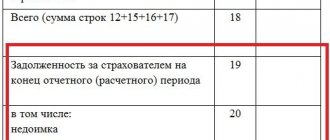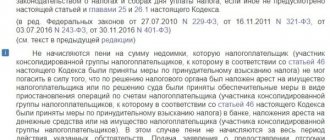How are arrears and debt related?
Usually, when talking about debts to the budget, these words are used as synonyms, but there is a difference between them. They are distinguished, for example, by Article 57 of the Code: “Recognition of arrears and debts on penalties and fines as hopeless.” That is, it is obvious that these are different obligations to the Federal Tax Service. Strictly speaking, tax arrears are debt without penalties. The legal norms for both types of debt have many overlaps, and in general they are interrelated. Therefore, we consider the topic comprehensively.
Comparison
The main difference between arrears and debt is that the first term has a much narrower range of application and denotes only the amount of tax, fee or contribution that a citizen or organization owes to the state represented by individual bodies or funds. In addition, arrears most often indicate a unilateral obligation - to the state.
Debt is a much broader concept. It can mean, in principle, any amount of money that one individual, organization or government entity owes to other entities. Or, on the contrary, they expect to receive from them. Debt is a tax, fee or contribution that has not turned into arrears, but which a citizen or company still manages to pay on time.
The term "debt" is often used to refer to an amount that must be paid by a government agency (usually the one that collects taxes, fees, or assessments) to those individuals who typically pay the payments themselves. So, if a company overpaid taxes, then it receives the right to return them from the budget - and in this case, the Federal Tax Service forms a debt to it.
There are two types of debt: current and overdue. In the first case, it is not accompanied by the accrual of penalties. In the second, the obligated party may also be forced to pay a penalty.
Having determined what the difference is between arrears and debt, we will reflect the conclusions in the table.
Types of arrears
From January 1, 2022, the Federal Tax Service (FTS), in addition to tax arrears, also monitors payments to the Pension Fund, Social Insurance Fund, and FFOMS.
The following situations are classified as arrears:
- non-payment of the accrued amount;
- partial payment of the accrued amount;
- excess amount of tax returned to the payer (for example, VAT);
- understated tax base: by mistake or intentionally.
In all of the above cases, the following will be added to the resulting debt amount:
- penalties: percentage for each day of delay (the report starts from the next day after the payment deadline or an error in the calculations is identified);
- fines: payment of a certain amount once.
The arrears are revealed during an audit or when submitting reports to the Federal Tax Service.
How to fulfill the requirement
The minimum period within which a taxpayer must pay off the tax arrears based on the inspection requirement is 8 working days from the date of receipt of the document (Clause 6, Article 6.1, Paragraph 4, Clause 4, Article 69 of the Tax Code of the Russian Federation). If he does not comply with the requirement, then:
- no later than 2 months after the end of the deadline for fulfilling the requirement, the inspectorate makes a decision to collect the debt from the debtor’s accounts opened in banking and credit institutions (clause 3 of Article 46 of the Tax Code of the Russian Federation);
- after 2, but no later than 6 months after the end of the deadline for fulfilling the demand for payment of arrears, penalties, fines, etc., the inspection has the right to submit an application to the arbitration court in order to recover the necessary amount of debt from the taxpayer. If the inspectorate, for good reason, missed the deadline for filing this application, the court may reinstate it (paragraph 1, paragraph 3, subparagraph 5, paragraph 11, article 46 of the Tax Code of the Russian Federation, article 117 of the Arbitration Procedure Code of the Russian Federation).
How is arrears collected?
The procedure for collecting debts and arrears of taxes and contributions is described in Articles 45-47 of the Code.
Sources of debt repayment:
- funds that are in the organization’s account;
- precious metals (if you have an account in precious metals);
- electronic money;
- property.
First of all, a bank account is used for collection, then electronic wallets, and only after that the property of a legal entity or individual entrepreneur is taken into account.
Next we will talk about the stages of repayment of arrears.
Table
| Arrears | Debt |
| What do they have in common? | |
| The debt of a citizen or company for a tax, fee or contribution that is not repaid on time turns into arrears | |
| What is the difference between them? | |
| Represents the amount of tax, fee, or contribution that an individual or organization is required to pay to the government by law | Represents the amount of money that an individual or organization must pay to (or be entitled to receive from) another entity by law or by virtue of a contract |
| As a rule, it is unilateral in nature - when a private person or organization owes the state | Can be mutual in nature, can be creditor and debtor |
| Formed only upon delay in payment of the amount | Is current upon occurrence by virtue of law or contract, becomes overdue upon failure of the obligated party to transfer payment on time |
| The government agency authorized to collect arrears may impose a penalty on it | Overdue debt may be accompanied by the accrual of a penalty by force of law or contract |
Repayment Request
When the Federal Tax Service discovers arrears or debt, it, of course, calls for repayment of the debt. To do this, the taxpayer is sent a demand for payment (contents according to Article 69 of the Tax Code of the Russian Federation).
The deadline for its presentation is limited:
- 3 months from the date of identification of a debt of more than 500 rubles and 1 year for smaller amounts.
- If a violation is found during a tax audit, then notification of the debt must arrive no later than 20 days from the date of its discovery.
The Federal Tax Service is required to notify the Federal Tax Service of arrears of insurance premiums no later than 10 days later.
The requirement states:
- details of the Federal Tax Service, organization or individual entrepreneur;
- amount to be paid, including fines and penalties;
- legal grounds for collecting arrears;
- deadlines for voluntary debt repayment;
- further procedure in case of ignoring this requirement.
The requirement is submitted personally under the signature of the manager (or individual entrepreneur), sent by registered or email, or recorded in your personal account on the tax website. Registered mail is automatically considered received 6 days after sending.
The company did not pay the arrears specified in the demand. What is the further procedure for collection?
In this case, the tax office has two months to make a decision on collecting the arrears. Within six days after making a decision, the inspectorate must send it to the company.
If the inspectorate has not made a decision on forced collection within two months, it means that the deadline for extrajudicial collection has expired. Now tax authorities can collect arrears only through an arbitration court.
It also happens that, simultaneously with the decision to collect, the tax office blocks the company’s account so that the money cannot be withdrawn. There is also the option of seizing property. But for this, the inspection must obtain permission from the prosecutor. And to obtain it, you need to have sufficient arguments proving that the company will be able to hide the property.
The decision on collection is executed as follows. First, the tax office will send an order to the bank to transfer money to cover the arrears from the company’s account to the budget. The bank is obliged to execute this order no later than the next day. If there are not enough funds in the account, the tax authorities “shake” the company further (electronic, foreign currency accounts, etc.)
How to dispute arrears
There are reasons to challenge the arrears presented for payment and penalties on them:
- an incorrectly drawn up demand for repayment (we have already outlined the points above, the form of the document is determined by Order of the Federal Tax Service No. ММВ-7-8/662 dated 10/03/2012);
- errors in the formation of the tax base and reporting, which led to excessive amounts of taxes and fees;
- discrepancy between tax audit data and requirements for payment of arrears.
Arrears on taxes and fees is a reason to double-check that you have paid everything. Don't panic. You need to order a free reconciliation of payments to the budget from the tax office, and then solve the assigned tasks in the current situation.
How does arrears appear?
There may be several reasons for the appearance of debt to the budget.
- The taxpayer (policyholder) missed the deadline for paying a tax or contribution.
- The payment was debited from the account, but did not reach the budget (yes, this happens).
- The payment went to the wrong KBK.
- There were other errors in the payment order and the payment fell into the unknown.
- A deduction was unlawfully received (for example, for VAT).
- During the audit, additional taxes or fees were assessed for past periods.
As you can see, it’s not just about how timely the tax was paid, but also about many other factors.
In the definition of the Tax Code of the Russian Federation: “arrears are the amount of tax, the amount of fees or the amount of insurance premiums that have not been paid within the period established by the legislation on taxes and fees.”
Please note that if you made a mistake only in the KBK, then you have the opportunity not to pay penalties and fines arising from arrears - we will explain why this is so and how to act correctly below.
Checking settlements with the budget for penalties
To check calculations with the budget for penalties, you can create a report Account Analysis 68.02 “Value Added Tax”, section Reports - Account Analysis.
The absence of a final balance in account 68.02 “Value Added Tax” for Types of payments to the budget (funds) - Penalties: additionally accrued / paid (independently) means that there is no debt to pay VAT penalties.
When does criminal liability arise for tax evasion?
An important circumstance is that the violation was committed intentionally, as a result of which the budget received a loss of a large or especially large amount. It is also necessary to remember that a criminal case for non-payment of taxes can only be initiated against an individual: the head of an organization (founder, chief accountant), individual entrepreneur, citizen. Besides,
How do materials get to investigators? There are 2 options. The first (paragraph 3, paragraph 4, article 69) - the amount of arrears for an individual taxpayer exceeds 900,000 rubles over the last three years, for a taxpayer (tax agent) - an organization - 5 million rubles. On this basis, the documents are handed over to investigators who are already studying the reasons for regular non-payment. The second option (clause 3 of Article 32 of the Tax Code of the Russian Federation) is the transfer of materials in connection with failure to comply with the requirement to pay a mandatory payment for two months.
To make it easier to understand what criminal liability is provided for tax offenses (2020), look at the table.
| Type of offense, norm of the Criminal Code of the Russian Federation | Intended punishment |
| Evasion of an individual from paying taxes, fees or insurance premiums (Article 198 of the Criminal Code of the Russian Federation). |
|
| Evasion of an organization from paying taxes, fees or insurance premiums (Article 199 of the Criminal Code of the Russian Federation). |
|
Let us note that criminal liability for tax crimes is also provided for tax agents. Since failure to fulfill the obligation to withhold and transfer funds is considered as non-payment of taxes, the Criminal Code of the Russian Federation provides (Article 199.1 of the Criminal Code of the Russian Federation) similar sanctions for this offense. In addition, there is a separate penalty for concealing income or property that could be used to pay off the arrears. In this case, the official of the organization or individual entrepreneur faces (Article 199.2 of the Criminal Code of the Russian Federation):
- a fine of 2,000 to 2 million rubles or in the amount of wages or other income of the convicted person for a period of up to 5 years;
- or forced labor for a period of up to 5 years with or without deprivation of the right to hold certain positions or engage in certain activities for a period of up to 3 years;
- or imprisonment for a term of up to 7 years with or without deprivation of the right to hold certain positions or engage in certain activities for a term of up to 3 years.
Is it possible to offset an overpayment against arrears at the time of simultaneous submission of updated declarations?
The general procedure for offsetting the amount of overpaid tax does not determine the procedure for recognizing the corresponding amounts as overpaid, and also does not establish the time frame within which tax authorities must check the organization’s statement about the presence of an overpaid amount of tax.
At the same time, the establishment of the fact of excessive payment of tax payments can only be revealed during a desk tax audit. This was pointed out by the Supreme Court in paragraph 11 of Information Letter No. 98 dated December 22, 2005. In addition, the courts previously had the following point of view: it is possible to offset an overpayment against tax arrears only on the condition that the specified overpayment was actually confirmed at the time of detection arrears. At the same time, tax authorities are not required to simultaneously conduct a desk audit of updated tax returns for different tax periods, even if they were filed at the same time (Resolution of the Presidium of the Supreme Arbitration Court of January 19, 2010 No. 11822/09).
Therefore, it will not be possible to count on a tax offset at the time of simultaneous submission of declarations containing amounts for both additional assessment and reduction.
What to do if you yourself overpaid VAT, read in the berator “Practical Encyclopedia of an Accountant”
In this case, in order to avoid liability, the organization can pay the amount of arrears and penalties to the budget until the submission of updated tax returns. Or postpone the submission of updated declarations, which state the amount to be paid, until the tax authorities confirm the presence of an overpayment of tax.
Previously on the topic:
Will the tax overpayment be refunded if there is an overdue arrears?
RF Armed Forces: while the tax office is processing the offset of the overpayment, no penalties will be charged
“Penalty” window when tax is offset



